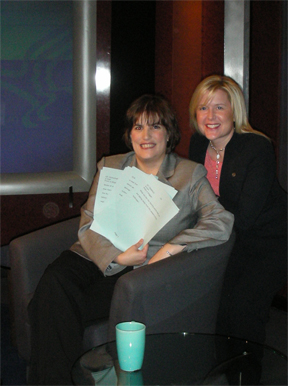July 13th, 2010 by EvanFalchukJD in Better Health Network, Health Policy, News, Opinion, Research, True Stories
No Comments »

If a website touted misleading healthcare information, you’d hope the government would do something about it. But what do you do when the government is the one feeding the public bad information?
Last week the Obama administration launched the new Healthcare.gov. It’s mostly an online insurance shopping website. It’s very much a federal government version of sites like eHealthInsurance.com or Massachsetts’ HealthConnector site, which have been around for years.
So when HHS Secretary Kathleen Sebelius, in announcing the new site, claims it gives consumers “unprecedented transparency” into the healthcare marketplace, you should wonder what she means. But that’s not the big problem with this site. Read more »
*This blog post was originally published at See First Blog*
November 23rd, 2009 by Dr. Val Jones in True Stories
No Comments »
 The Department of Health and Human Services held a blogger-targeted webcast about the H1N1 flu today in Washington, DC. Although Secretary Kathleen Sebelius had planned to co-lead the event, she was called to the White House for some healthcare reform deliberations – which might take a while? (She promises to try again to speak to us bloggers at a later date, though, so I’ll be sure to let you know when that happens). Dr. Anne Schuchat, Director of the National Center for Immunization and Respiratory Diseases, carried the event with ease, and Jenny Backus (Acting Assistant Secretary for Public Affairs – pictured with me) moderated the incoming blogger and Twitter questions.
The Department of Health and Human Services held a blogger-targeted webcast about the H1N1 flu today in Washington, DC. Although Secretary Kathleen Sebelius had planned to co-lead the event, she was called to the White House for some healthcare reform deliberations – which might take a while? (She promises to try again to speak to us bloggers at a later date, though, so I’ll be sure to let you know when that happens). Dr. Anne Schuchat, Director of the National Center for Immunization and Respiratory Diseases, carried the event with ease, and Jenny Backus (Acting Assistant Secretary for Public Affairs – pictured with me) moderated the incoming blogger and Twitter questions.
This was a particularly entertaining webcast for me because I was invited “behind the scenes” to witness the event at the HHS studio as well as submit questions for Dr. Schuchat’s consideration. The webcast is available for viewing on the HHS YouTube channel.
What you may not get from the webcast, however, is how much work goes into HHS’s efforts to communicate accurate information to the public. I was very impressed with the studio space (it has a National Press Club feel) and the staff are technically skilled and affable. So friendly were they that I “memorialized” our meeting with a few candid shots (below). Read more »
November 20th, 2009 by Dr. Val Jones in Announcements
No Comments »
 Do you have any nagging questions about the H1N1 flu? Then please join me at a special blogger briefing at HHS on Monday at 3:30pm ET. In a Better Health/MedPage Today exclusive, I’ll be live-blogging the event from inside the HHS studio in DC, and the conversation will be available via live webcast. Please send in your questions in advance (press release and instructions are below) or feel free to forward developing questions to me via Twitter: @drval during the event. Hope to chat with you soon!
Do you have any nagging questions about the H1N1 flu? Then please join me at a special blogger briefing at HHS on Monday at 3:30pm ET. In a Better Health/MedPage Today exclusive, I’ll be live-blogging the event from inside the HHS studio in DC, and the conversation will be available via live webcast. Please send in your questions in advance (press release and instructions are below) or feel free to forward developing questions to me via Twitter: @drval during the event. Hope to chat with you soon!
***
Please join the Department of Health and Human Services (HHS) for a special briefing on H1N1 flu. As your readers turn to you for accurate and timely information about the ongoing H1N1 pandemic, we want to arm you with the most current information and take your questions on H1N1 and seasonal flu. Send us the questions that you or your readers want to know and our communication experts will answer them during the webcast. Send questions to hhsstudio@hhs.gov by Sunday, November 22th at 3 pm (EST). Read more »
May 25th, 2009 by EvanFalchukJD in Better Health Network
No Comments »

Writing about health care reform, Peggy Noonan complains of the decay of the English language:
A reporter asked a few clear and direct questions: What is President Obama’s health plan, how would it work, what would it look like? I leaned forward. Finally I would understand. [Secretary of Health and Human Services Kathleen] Sebelius began to answer in that dead and deadening governmental language that does not reveal or clarify, but instead wraps legitimate queries in clouds of words and sends them our way. I think I heard “accessing affordable quality health care,” “single payer plan vis-a-vis private multiparty insurers” and “key component of quality improvement.” . . . . As she spoke, I attempted a sort of simultaneous translation. . . . But I gave up. Then a thought crossed my mind: Maybe we’re supposed to give up! Maybe we’re supposed to be struck dumb, hypnotized by words and phrases that are aimed not at making things clearer but making them obscure and impenetrable. Maybe we’re not supposed to understand.
Noonan is on to something, but it’s not what she thinks. What she’s hearing is real-life language of our health care system from the people in charge of it. And it’s not just government officials who talk this way — Sebelius’ language is just as common in the private sector.
It reveals the deepening divide between how people talk about health care and what it really means to be sick. Noonan jokes that if Sebelius’ child were to get a high fever she might say “This unsustainable increase in body temperature requires immediate access to a local quality health-care facility,” instead of just “We have to go to the hospital.” But I don’t believe that.
When a loved one is sick, all the abstract ideas melt away. It becomes about trying to get help from a doctor, and a doctor doing his or her best to help.
You might think our health care system would be set up to make that process easier. But it isn’t.
Patients and doctors report in overwhelming numbers how dissatisfied they are with what they see as the interference of well-meaning insurers, governments and others.
You might also think that the reform conversation happening in Washington would have the doctor-patient relationship at the forefront. But it doesn’t.
Look at the “eight principles of health care reform,” proposed by the President and supported by the big players in health care:
(1) protecting families’ financial health, (2) making health coverage affordable, (3) aiming for universality, (4) providing portable coverage, (5) guaranteeing choice, (6) investing in prevention and wellness, (7) improving patient safety and quality, and (8) maintaining long-term fiscal sustainability.
What does all of this stuff mean? How do you talk about health care and not even use the word “doctor” or talk about “patients”? Worse, I’m not sure more than one or two of these even qualify as “principles” as that word is normally used. So what’s going on?
I don’t think anyone is trying to deceive anyone. Like Sebelius’ choice of words, the list is as much of a description of the problem as a solution to it. We don’t have a consensus of what is really important in health care, so we avoid the problem altogether by using vague language that everyone can support. What’s worrisome is that vague, abstract talk is almost certain to lead to vague, abstract solutions.
Before we try to reform health care, let’s first talk about it in plain, clear language.

*This blog post was originally published at See First Blog*















